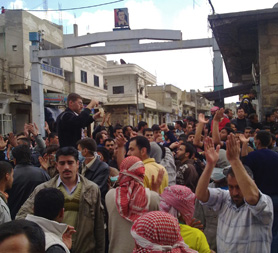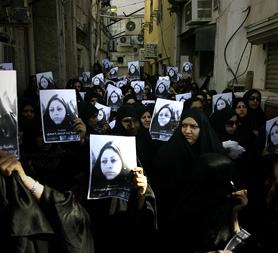At least six dead in crack down as unrest spreads to Syria
As Syrian forces crack down on protests against President Assad’s regime, a Middle Eastern expert identifies Syria as most vulnerable to the revolutionary tide sweeping the Middle East.

Syrian forces killed at least six people in an attack on a mosque in the southern city of Deraa and, in a separate incident, opened fire on hundreds of young demonstrators local residents have said.
The attacks follow unprecedented protests challenging President Bashar al-Assad’s rule after he dismissed rising demands for fundamental reform in Syria where his Baath Party has held a monopoly on power for 48 years.
Those killed at the Omari mosque in the city’s old quarter included Ali Ghassab al-Mahamid, a doctor from a prominent Deraa family who went to help victims of the attack, which occurred just after midnight, said the residents.
Following the attack in Deraa, an official Syrian statement said: “Outside parties are transmitting lies about the situation in Deraa”, blaming what it described as armed gangs for the violence.
The statement said doctor Mahamid, who was killed while he was in an ambulance that had arrived at the scene to rescue the injured, was “assaulted by an armed gang”.
Later, there were reports that syrian security forces had opened fire on hundreds of youths who had marched on Deraa after the earlier killings at the mosque. One eyewitness reported “The security forces fired as they came from the north, bodies fell in the streets.”
Coming just a day after the U.N. Office for Human Rights urged the authorities “to put an immediate halt to the excessive use of force against peaceful protesters, especially the use of live ammunition”, the attacks brought to at least 10 the number of civilians killed by Syrian forces during six days of demonstrations for political freedoms and an end to corruption in the country of 20 million people.
Syria is similar to Tunisia in the way the regime controls every aspect of political life. Dr Frederic Volpi
Dr Frederic Volpi, a senior lecturer at the University of St Andrew’s School of International Relations, said that Syria may be the country most vulnerable to the unrest spreading through the region because Syrian people have few outlets to express their views.
“Syria is similar to Tunisia in the way the regime controls every aspect of political life,”said Dr Volpi. “There is potential for a direct challenge to the regime and potential for this to lead for revolution.
“As in Tunisia, Syria’s military are the power behind the regime.”
He said that events in Syria, like Tunisia before it, would take the world by surprise and also predicted change in Yemen.
“Yemeni opposition to the ruling regime has gained strength over the past few weeks. President Salah has made concessions to opposition but it could be too little too late,” he said. “Maybe very soon we will have an actual change of regime.”
Dr Volpi said that the Saudi government has been very effective at staving off protests so far through hand outs, but he said that the movement for change in the Middle East was striking by its ability to confound expectations.
“I am sure the events in the region will continue to surprise us,” he said.

Yemen
Yemeni President Ali Abdullah Saleh has now proposed holding presidential elections by the end of this year in an effort to satisfy democracy protesters demanding his immediate resignation.
Under his proposals, there would be a referendum on a new constitution then parliamentary elections. The elected parliament members would form a government and elections for president would be held before the end of 2011.
The opposition has rejected Saleh’s early poll offer and called on protesters to march on his Sanaa palace to demand he step down, hoping to end a crisis his allies abroad fear will benefit Islamic militants.
Salah’s offer follows violent events last Friday when gunmen loyal to Saleh opened fire on demonstrators, causing the deaths of 52 people. Saleh sacked his cabinet and declared a state of emergency, but the bloodshed has lent protests a new severity.
Seven weeks of street protests against Saleh’s 32-year rule of the impoverished Arabian Peninsula state has raised alarm in Western capitals at the prospect of a country where al Qaeda has entrenched itself falling apart.
Al Qaeda cells in Yemen have in the past two years attempted attacks outside Yemeni soil in Saudi Arabia and the United States.
Bahrain
A Bahrain woman has died of gunshot wounds as the political crisis in the gulf state saw sectarian tenstions worsen.
Opposition group Wefaq said the exact circumstances of how she came to be shot were not clear, but she had apparently been driving her car in the west of the capital Manama.
Bahiya al-Aradi’s death brings to seven the number of Bahraini civilians confirmed to have been killed since last Wednesday’s crackdown when forces forces ended an uprising by mostly Shi’ite protestors.
Four police were also killed last week and local newspapers say two foreign workers, an Indian and a Bangladeshi, also died as sectarian clashes spread.
Bahrain has suspended its flights to and from Lebanon and warned its nationals not to travel there following declarations of support by Iranian-backed Shi’ite group Hezbollah for the protests.
The decision highlights growing tensions in the world’s largest oil-exporting region between Sunni-ruled Arab countries and non-Arab Shi’ite power Iran, just across Gulf waters.
Saudi Arabia
The Saudi Arabian authorities arrested 100 Shi’ite protesters during demonstrations in the east of the country last week, a Saudi human rights group has said.
Hundreds attended protests in and around the region’s main Shi’ite centre, Qatif, calling for the release of prisoners and withdrawal of Saudi forces from Bahrain.
A statement by the Human Rights First Society said it was “appalled” by reports that some of these 100 detainees were subjected to physical and psychological torture.
Saudi Arabia plans to begin municipal elections next month, the first political concession since the protests sweeping the region hit the kingdom.
The Saudi government is trying to stave off a wave of unrest that toppled the rulers of Egypt and Tunisia and that has spread to neighbouring Yemen, Bahrain and Oman.
Saudi Arabia, a U.S. ally and the world’s top oil exporter, has not see the kind of mass uprisings that have rocked the Arab world this year, but dissent is simmering.
Saudi Arabia sent 1,000 troops to Bahrain, also led by a Sunni monarchy, last week to help contain pro-democracy protests led by majority Shi’ite Muslims.